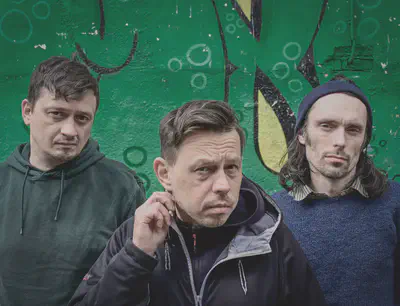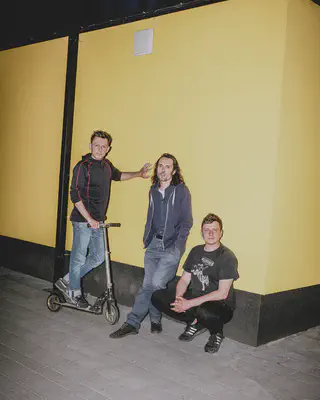‘I feel at home where people care’
Listen Local Interview

Considering that Sebastiaan is Dutch, how did you meet and where?
Sebastiaan: It’s a funny story. At one point I was living in Sarajevo, in Bosnia and Herzegovina. Kurws played in an old cinema theatre there, so I went to see their concert and really liked it. Then a few years went by, and my wife and I moved to Wrocław. I knew that Kurws are from there, so I just sent them a message: ‘Hey guys, I’m a drummer, and I’m looking for people to play with.’ That’s how we met.
Kuba: He got immediately incorporated into our CRK Salka family because I was organizing a tour for another band, Barłóg, and their drummer got very ill right before leaving. I just said to Sebastiaan ‘You’re in now, you have to replace her!’. I sent him all the tracks and he just learned them.
Sebastiaan: It was a very warm welcome—I moved to Wrocław and two or three months later I was already going on tour. Then, via Kurws I got involved in this small music community CRK Salka. It is a rehearsal space, a collective where bands help each other and organise things together.
Now that you’ve travelled and had many concerts, where do you feel most at home?
Kuba: I wouldn’t want to pinpoint a certain geographical location because I think that is not really an issue. You can find places to feel at home anywhere. There are places in Europe and Asia where I felt at home, places in Russia, places in Portugal. For me, the definition of a place where I feel at home is where people care, love our music or have other reasons to be excited about us doing something together.

How would you describe your audience? Are they mostly from Poland?
Kuba: I don’t think so. Of course, the local public is the best because they always appear on our shows. But I feel like having a dual life—we have our public here in the city and at the same time everywhere else in the world. There are some dedicated people and we have quite some public in Poland. I think in most cases our audience is made of people who are into music, who play or used to play music, or who, after seeing an exciting show, decide to take the first steps in relating their lives to music.
If you would look for expanding your audience, where would you aim to do that?
Sebastiaan: I think the best way to get people to know your music is just to play a lot and to tour, play abroad and help bands that you get to know along the way. This is the best way to grow your audience organically. But I think this is not our mission per se. This is just something that happens.
Kuba: The question was new to me because I never really thought about this. I was always curious to be somewhere in the world that I have never been to before and I was curious about how people would respond to our music. That’s why I decided to book certain tours, and we got invited by artists to other parts of the world. It was a natural process. I want to go where I want, where I am wanted, and the rest comes. If you respect people and if you’re honest, it comes back.
Sebastiaan: Mutual respect can get you very far as a band. For example, the Dutch band Ex marked history by doing that—playing in other countries and inviting bands to come to play with them. This is a ‘do it together’ mentality. If you respect each other, you respect the people that you meet, the rest just goes automatically. I wouldn’t say it’s a deliberate mission to look for a new audience, it’s just something that happens when you play. I don’t have so much experience, but Kurws already have fourteen years of experience in operating in such a way. I think this works best.

Do you draw inspiration from other artists in Wrocław or around?
Sebastiaan: When I moved here, I didn’t know that Kurws were part of the CRK Salka collective. There are four or five bands that are closely connected—either they share members among bands, or they help each other. And they all have the same approach to music or the to how music should be.
Kuba: It’s inspiring to discover that you’re being inspired by your friends and that you can inspire them. Whenever I was reading about some music scenes in the past, I would never imagine that I would be part of one. And it just happened very naturally between a couple of friends. It was never a big scene, now it’s even smaller than it was, but we are pretty rooted. In the end, it’s just a few people, but I know that if one band would disappear, another would pop up. We’re sticking together and that’s very inspiring.
Sebastiaan: It’s also inspiring music-wise, but in the end it’s all about being in something together, helping each other. For example, during the pandemic, we had a small showcase festival of our rehearsal space community. Back then there were still restrictions, so we only had 30-40 people in the audience, it was a rather small event. But at the same time, it was quite big in production. That was an inspiring day, as all the bands at the rehearsal place were performing. One guy who was not playing was filming instead, some girls made the artwork and posters—everyone was involved and that was very inspiring, apart from the music. It’s an approach to music and playing.
For people visiting Wrocław, what would you recommend, either places or artists?
Sebastiaan: There’s Czuła jest noc, it’s a club close to the main railway station. It’s under the tracks, so every few minutes there is a train going over. It’s a small bar and it also has a small concert hall. It’s one of my favourite places here in the city. When we had some gigs or album presentations, it was in there.
Kuba: There’s also a bookshop, where the bassist of the band ‘Atol Atol Atol’, formally in a band Ukryte Zalety Systemu, works. He was also in a band that I had before ‘Przepych’, so he’s part of our community and a pretty engaged member. He’s working daily in the bookshop and in this bookshop they also do events and concerts. The place is called Tajne Komplety and they started making streamed concerts during the pandemic. They called the cycle Tajne Koncerty and apart from the cycle, there were also regular shows sometimes, but it’s mostly acoustic music, not that loud. It’s a very nice place.
Are you excited about your upcoming tour?
Kuba: As hell! Kurws used to have at least one 3-week tour each year and then the pandemic paused everything. So, this would be the longest tour in four years. It’s going to be twelve days. Usually is a bit under, so we’ll see how we’ll survive it. Maybe we are too old! But I’m pretty sure it’s going to turn out great.
You can listen and purchace Kurws’ latest album Powięź / Fascia here:
You can listen and purchase Zdrój’s latest album here:
You can listen and purchase Barłóg’s music here:
We had conversations with other European artists on similar topics: OOPUS | Bookie Baker | Jeremy Dunne | Katarzia | Twentees | Youniverse | Robin Kester | Marie de la Montagne | Damir Bašić aka Duka & with small companies and startups Tiny Rooms | LaPee | Flower of Sound | Hajde | From Rec to Play
Engage with Data&Lyrics on LinkedIn or @dataandlyrics! You can find our here open data and open repositories, code, tutorials.